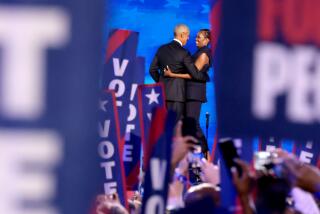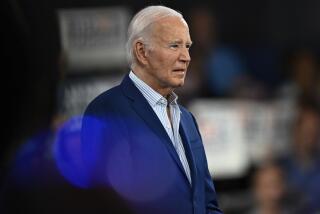Ill grandma a central figure for Obama
- Share via
MIAMI, — Barack Obama’s mother was an adventurous woman who took her son around the globe.
His grandmother was a rock of stability, giving him the American roots that would ground his teenage years as well as his career in politics.
His mother died too young to see him become a U.S. senator, much less the Democratic nominee in the 2008 presidential election and someone who could become the first African American to win the White House.
Now, just two weeks before the election of his life, that other maternal figure -- Madelyn Dunham, who helped raise him -- is in such fragile health that family members are gathering at her bedside in Honolulu.
The nation hasn’t really met this important figure in Obama’s life. Dunham, who will turn 86 on Sunday, has rarely spoken to the press, and she doesn’t appear at campaign events or important ceremonies.
Yet she is an integral part of his story, a woman he speaks of often when he’s campaigning. He has invoked memories of her at his most crucial moments in politics, notably when dealing with the complex multicultural tapestry that is his personal narrative.
Those close to Obama say she is more than just a part of that story; she’s part of his personality -- a towering image reflected in her grandson right alongside that of her daughter, his mother, Stanley Ann Dunham.
“The two women who really raised him, his mom and grandma, are both strong, and they’ve struggled in the course of their lives and overcome great obstacles,” said Valerie Jarrett, a close Obama family friend.
“They are extraordinarily determined and empathetic, and I see that in him,” she said. “All of these unusual characteristics, they’re all rolled up into one person.”
Obama’s wife, Michelle, often speaks of the two “strong women” who made her husband who he is. Both she and Jarrett point to the life experiences of the Dunham women to explain Obama’s core beliefs about women, work and families.
One of those women gave him wings. The other gave him roots.
Stanley Ann Dunham, who was white, married Obama’s father, a Kenyan student, and had her son when she was a young woman. She later married Lolo Soetoro, the father of Obama’s sister, Maya, and the couple moved their family to Indonesia.
But a time came when the family agreed that Obama should return to the U.S. for high school. The grandparents he called “Gramps” and “Toot” took him in, living in a modest Honolulu apartment so they could send him to the elite Punahou Academy.
In a rare 2004 interview with the Chicago Tribune, Madelyn Dunham noted her daughter’s global interests and said she and her husband offered Obama a greater sense of normality.
“I suppose I provided stability in his life,” she said.
She also spoke of the prejudice she assumed her grandson experienced in Hawaii.
“Barack didn’t really talk about things too much, you know,” she said. “He must have suffered some racial prejudice, but he didn’t talk about it with us.” It was a complicated relationship between the black grandson and his white grandparents, one that Obama explored achingly in his book -- and, for a brief period this year, on the campaign trail.
His 1995 book, “Dreams From My Father,” recounts a conversation with his grandfather, in which the older man tells him that “Toot” wanted to ride to work because she was afraid of a panhandler at the bus stop. “[S]he told me the fella was black,” his grandfather said, according to Obama’s book. “That’s the real reason why she’s bothered.”
Obama later concluded that his grandmother had displayed a more clear-eyed view of the hidden dynamic between blacks and whites. But at the time, he wrote, the words were “like a fist in my stomach.”
The memory surfaced again for him last spring, as Obama wrestled with the political fallout of racially charged comments made by his former pastor, the Rev. Jeremiah A. Wright Jr. In an important address about race relations, Obama said he could no more disown Wright than he could his “white grandmother,” someone he said “loves me as much as she loves anything in this world, but a woman who once confessed her fear of black men who passed by her on the street, and who on more than one occasion has uttered racial or ethnic stereotypes that made me cringe.”
As much as he has rejected those stereotypes, Obama has embraced another part of his heritage: Dunham’s upbringing is the link to the Kansas heartland that the candidate invokes so often.
This week, he returns to those roots. He is canceling events for most of today and Friday to go to Hawaii where his sister, Maya Soetoro-Ng, is caring for their grandmother. Aides to Obama won’t disclose her condition, but Dunham’s brother, Charles Payne, told the Associated Press that she recently fell and broke her hip.
One of Obama’s greatest regrets is not being at his mother’s bedside during her final hours, said David Mendell, the then-Tribune reporter who interviewed Dunham in 2004 and author of the book “Obama: From Promise to Power.”
“She and her husband were really there when he needed their love and support,” Jarrett said of Madelyn Dunham. “It should be no surprise that he would say, ‘Yes, this campaign is extremely important, but I am not going to forget the person who raised me and go back and be with her when she needs me.’ ”
More to Read
Get the L.A. Times Politics newsletter
Deeply reported insights into legislation, politics and policy from Sacramento, Washington and beyond. In your inbox twice per week.
You may occasionally receive promotional content from the Los Angeles Times.











